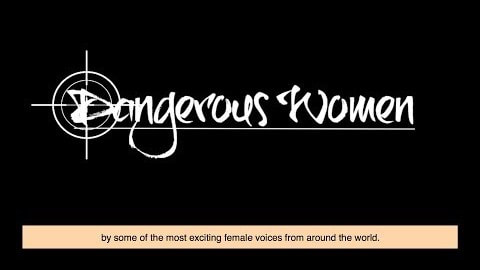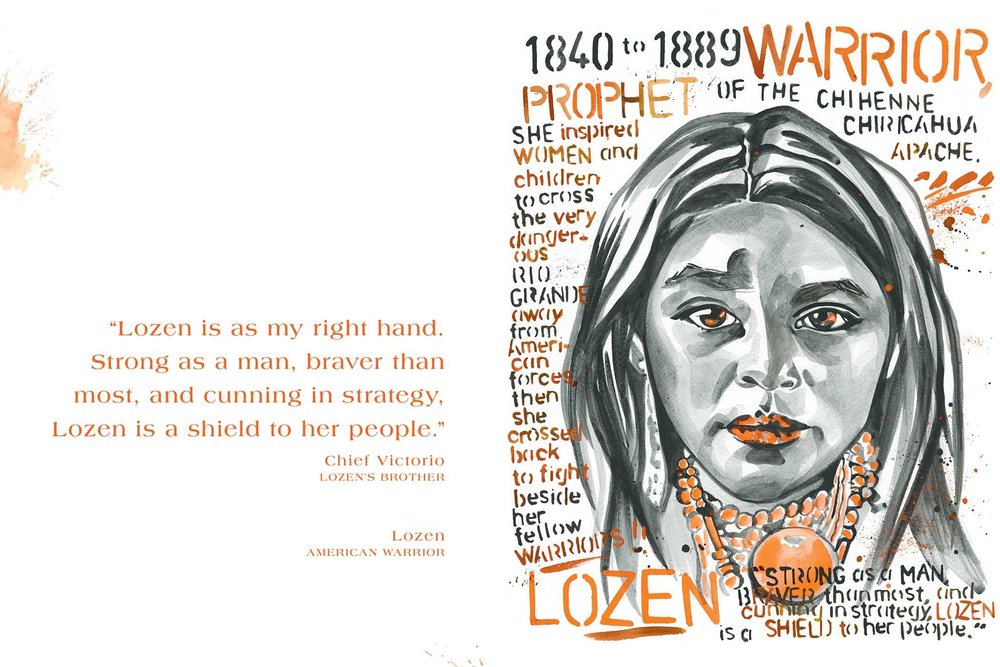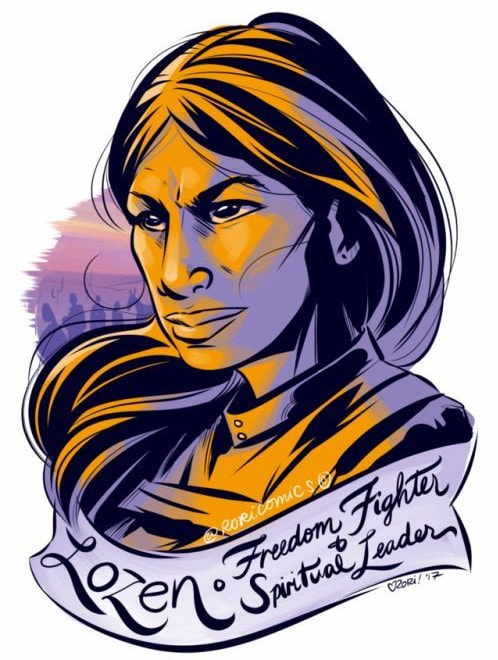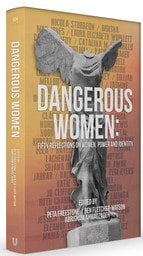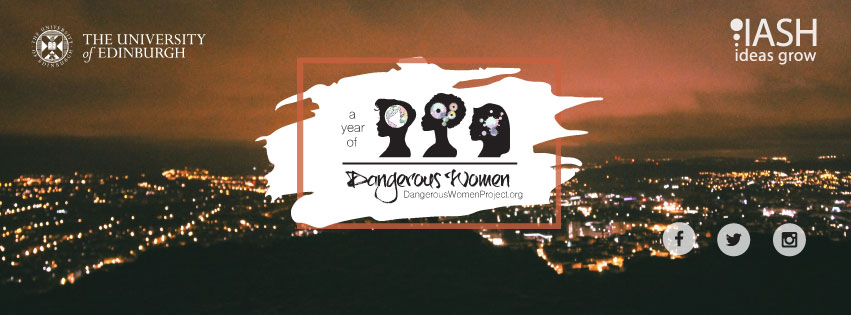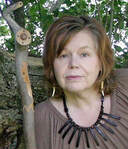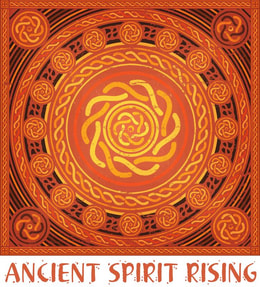Author Spotlight ~ Pegi Eyers
Interview by Abrisham Ahmadzadeh
Re-Print from Unbound ~ October 11, 2019
This week, we chatted with Pegi Eyers, a Dangerous Women author who is a devotee of nature-based culture and all that is sacred to the Earth. She lives in the countryside near Nogojiwanong in Michi Saagiig Nishnaabeg territory (Peterborough, Ontario, Canada) on a hilltop with views reaching for miles in all directions. Her piece targets the passive white woman in the struggle for intersectional feminism. I’ve asked Pegi three questions, in an attempt to see the book through her perspective.
Abrisham >> What is your writing process/routine?
Pegi >> Whether I am writing a book, paper, article or blog, I’ve become accustomed to the discipline of spending at least 5-6 hours a day developing research and capturing different themes in new stories and non-fiction. I love both the writing and editing process, so that makes my daily process a joy instead of a duty or a task! That’s not to say I don’t have uninspired days, but there is always so much to do in terms of responding to correspondence, planning for conferences, general promotion or graphic design my schedule never gets boring. Some of my best ideas arrive full-fledged in the liminal time between sleep and waking, so it’s imperative to have writing materials at hand.
Abrisham >> What did the Dangerous Women Project mean to you?
Pegi >> The Dangerous Women Project has been an integral force in furthering women’s voices and perspectives into all sectors of society. Leading the way in supporting the freedom of expression that is due all women, the DWP has provided an amazing platform for our objections as we continue to rage against the injustices of a male-dominated world. Let us hope that as our collective defiance gives rise to a new era of empowerment for ourselves, our communities and the wider world, we stay focused on positive social, economic and political change for the greater good of all. Such is our power!
Re-Print from Unbound ~ October 11, 2019
This week, we chatted with Pegi Eyers, a Dangerous Women author who is a devotee of nature-based culture and all that is sacred to the Earth. She lives in the countryside near Nogojiwanong in Michi Saagiig Nishnaabeg territory (Peterborough, Ontario, Canada) on a hilltop with views reaching for miles in all directions. Her piece targets the passive white woman in the struggle for intersectional feminism. I’ve asked Pegi three questions, in an attempt to see the book through her perspective.
Abrisham >> What is your writing process/routine?
Pegi >> Whether I am writing a book, paper, article or blog, I’ve become accustomed to the discipline of spending at least 5-6 hours a day developing research and capturing different themes in new stories and non-fiction. I love both the writing and editing process, so that makes my daily process a joy instead of a duty or a task! That’s not to say I don’t have uninspired days, but there is always so much to do in terms of responding to correspondence, planning for conferences, general promotion or graphic design my schedule never gets boring. Some of my best ideas arrive full-fledged in the liminal time between sleep and waking, so it’s imperative to have writing materials at hand.
Abrisham >> What did the Dangerous Women Project mean to you?
Pegi >> The Dangerous Women Project has been an integral force in furthering women’s voices and perspectives into all sectors of society. Leading the way in supporting the freedom of expression that is due all women, the DWP has provided an amazing platform for our objections as we continue to rage against the injustices of a male-dominated world. Let us hope that as our collective defiance gives rise to a new era of empowerment for ourselves, our communities and the wider world, we stay focused on positive social, economic and political change for the greater good of all. Such is our power!
Who is your favourite woman from history and why?
Pegi >> My favourite woman from history is Lozen, a Chihenne Chiricahua Apache oracle, healer, warrior and resistance strategist who lived during the 19th century. Beyond what the western lens considers suitable gender roles for women, Lozen was highly skilled in skirmish and evasion tactics in response to the European takeover of the Americas. Born during the 1840s on the borderlands of what is now New Mexico and Arizona, her leadership was considered equal to other freedom fighters like Geronimo, and her brother, the famous Apache chief Victorio.
Focused on the protection and well-being of every member of her matrilineal tribe, she inspired, encouraged and guided her people through the most dangerous situations imaginable. In addition to skills with battle strategy and weapons, Lozen was a fierce and unrelenting warrior on horseback, and also possessed remarkable spiritual powers in service to the struggle. Through chant, prayer, visions, remote viewing and prophecies, she provided direction by consistently identifying the location of the enemy (the American military) over great distances and diverse terrain. According to Alexander B. Adams in his book Geronimo, "she would stand with her arms outstretched, chant a prayer to Ussen the Creator, or Giver of Life, and slowly turn around." Lozen's prayer (below) is translated in Eve Ball's book In the Days of Victorio.
Pegi >> My favourite woman from history is Lozen, a Chihenne Chiricahua Apache oracle, healer, warrior and resistance strategist who lived during the 19th century. Beyond what the western lens considers suitable gender roles for women, Lozen was highly skilled in skirmish and evasion tactics in response to the European takeover of the Americas. Born during the 1840s on the borderlands of what is now New Mexico and Arizona, her leadership was considered equal to other freedom fighters like Geronimo, and her brother, the famous Apache chief Victorio.
Focused on the protection and well-being of every member of her matrilineal tribe, she inspired, encouraged and guided her people through the most dangerous situations imaginable. In addition to skills with battle strategy and weapons, Lozen was a fierce and unrelenting warrior on horseback, and also possessed remarkable spiritual powers in service to the struggle. Through chant, prayer, visions, remote viewing and prophecies, she provided direction by consistently identifying the location of the enemy (the American military) over great distances and diverse terrain. According to Alexander B. Adams in his book Geronimo, "she would stand with her arms outstretched, chant a prayer to Ussen the Creator, or Giver of Life, and slowly turn around." Lozen's prayer (below) is translated in Eve Ball's book In the Days of Victorio.
As the unrelenting juggernaut of Settler-Colonialism advanced over the homelands of the Apache, Lozen never capitulated to oppressive forces, but maintained her integrity and honor to the very end. Without romanticizing, whitewashing, or performing a "Settler Sidestep", I continue to be forever haunted and heartbroken by the multiple layers of meaning in Lozen’s story, and at the deepest level, the full implications of the genocide that occurred in the Americas.
The stories of all those who lost their lives to colonial violence continues to remind me of my own responsibility to make reparations, and restitution for the unforgivable racism of my ancestors. Instead of peaceful co-existence, or being good guests on lands already inhabited by a myriad of civilizations, the imperialist powers are still focused on control, religious conversion and white supremacy, and the same patriarchal domination of Indigenous peoples and Indigenous lands continues today. Instead of cultural amnesia or normalizing Empire, my hope is that Dangerous Women everywhere will continue to embrace the critically important work of social justice and challenging the patriarchy.
Abrisham >> Thank you Pegi! The conversations that have stemmed from the making of this book so far, are what the book is all about. The sheer volume of voices coming together for Dangerous Women is the most exciting part, and being able to bring so many powerful women together.
Who is your dangerous woman from history?
The stories of all those who lost their lives to colonial violence continues to remind me of my own responsibility to make reparations, and restitution for the unforgivable racism of my ancestors. Instead of peaceful co-existence, or being good guests on lands already inhabited by a myriad of civilizations, the imperialist powers are still focused on control, religious conversion and white supremacy, and the same patriarchal domination of Indigenous peoples and Indigenous lands continues today. Instead of cultural amnesia or normalizing Empire, my hope is that Dangerous Women everywhere will continue to embrace the critically important work of social justice and challenging the patriarchy.
Abrisham >> Thank you Pegi! The conversations that have stemmed from the making of this book so far, are what the book is all about. The sheer volume of voices coming together for Dangerous Women is the most exciting part, and being able to bring so many powerful women together.
Who is your dangerous woman from history?
DANGEROUS WOMEN
But what does it mean for a woman to be dangerous? Who, or what, does she present a danger to? Who gets to say she’s dangerous? Why do they want to say it? Does she consider herself dangerous? Is feminism dangerous? And what do the answers to those questions tell us about societies past and present? About our social and political structures, about our everyday lives, our attitudes and our very identities? Dangerous Women gives fifty wide-ranging perspectives on these questions.
We have welcomed poets, playwrights, artists, academics, journalists, historians, performers and opinion-formers, and indeed anyone with an angle on the theme, to reflect on the danger of females. Speaking from a variety of ages, ethnicities and cultures, we have come together from all over the world to give agency to any woman dismissed for her power, talent or success, trivialised as a threat or condemned for challenging the status quo. We are here to celebrate these women and applaud them for their strength.
In doing so, we have reclaimed the right to be dangerous, and highlighted the power of otherwise dismissed female figures. If you lack female idols, this book is for you. If you want to challenge the narrative that a powerful woman is a threat, this inclusive and diverse book is for you. Dangerous Women is for anyone and everyone who questions how to be dangerous, and indeed what that means. Jo Shaw, Ben Fletcher-Watson and Abrisham Ahmadzadeh
But what does it mean for a woman to be dangerous? Who, or what, does she present a danger to? Who gets to say she’s dangerous? Why do they want to say it? Does she consider herself dangerous? Is feminism dangerous? And what do the answers to those questions tell us about societies past and present? About our social and political structures, about our everyday lives, our attitudes and our very identities? Dangerous Women gives fifty wide-ranging perspectives on these questions.
We have welcomed poets, playwrights, artists, academics, journalists, historians, performers and opinion-formers, and indeed anyone with an angle on the theme, to reflect on the danger of females. Speaking from a variety of ages, ethnicities and cultures, we have come together from all over the world to give agency to any woman dismissed for her power, talent or success, trivialised as a threat or condemned for challenging the status quo. We are here to celebrate these women and applaud them for their strength.
In doing so, we have reclaimed the right to be dangerous, and highlighted the power of otherwise dismissed female figures. If you lack female idols, this book is for you. If you want to challenge the narrative that a powerful woman is a threat, this inclusive and diverse book is for you. Dangerous Women is for anyone and everyone who questions how to be dangerous, and indeed what that means. Jo Shaw, Ben Fletcher-Watson and Abrisham Ahmadzadeh
| Pegi Eyers is the author of "Ancient Spirit Rising: Reclaiming Your Roots & Restoring Earth Community," an award-winning book that explores strategies for intercultural competency, uncolonization, creating a sustainable future and reclaiming peaceful co-existence in Earth Community. Available from Stone Circle Press or Amazon |
